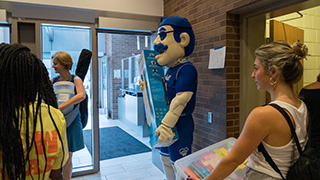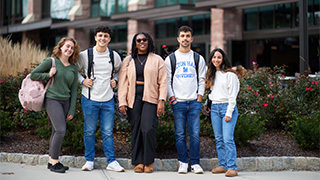Stop Killing our Patients: Pandemic, Protest and the Outcry for Justice
Wednesday, June 17, 2020

Originally focused on the impact of COVID-19, the topic of conversation in these panel discussions has shifted as the pandemic has served to highlight structural inequalities in health care evidenced by the disproportionate number of black and Hispanic people who have fallen prey to the coronavirus.
The last panel focused on "Discrimination in the Time of COVID," and included Seton Hall alumnus Dr. Sampson Davis, an ER physician who is perhaps best known as a best-selling author of The Pact: Three Young Men Make a Promise and Fulfill a Dream, the story of the success of three young men from Newark, New Jersey who pledged to support each other in pursuing careers in the field of medicine.
This next panel, fueled by the outrage and protest that ensued from the killing of George Floyd by a police officer in Minneapolis, Minnesota, is entitled "Stop Killing our Patients: Pandemic, Protest and the Outcry for Justice" and will be a discussion on issues of discrimination, the health implications of racism, the role of healthcare (and other) professionals in responding to racism and structural injustice which affects practitioners and their patients.
"America faces two public health crises – the COVID-19 Pandemic and the continued manifestations of structural racism exemplified by the most recent series of murders of black members of our communities," said Pilkington. "COVID-19 is real, and so is structural racism – and the end result of each is lives laid waste and a system that does not work for far too many."
Pilkington, an associate professor in the School of Health and Medical Sciences at Seton Hall University and the Hackensack Meridian School of Medicine at Seton Hall University, serves on the Editorial Board of the Journal of Medicine and Philosophy and the Editorial Advisory Boards of HealthCare Ethics Committee Forum and Christian Bioethics, and is a Junior Scholar at the Paul Ramsey Institute.
"Stop Killing our Patients: Pandemic, Protest, and the Outcry for Justice," will feature Dean Bonita Stanton of the Hackensack Meridian School of Medicine at Seton Hall University along with a multi-disciplinary panel of experts.
Bonita Stanton, M.D. is the founding dean of Hackensack Meridian School of Medicine at Seton Hall University. A nationally recognized expert on pediatric medicine, she is the author of more than 300 peer-reviewed articles and has served as an editor of the Nelson Textbook of Pediatrics, along with many other journals and books. Among many local, national and international advisory roles, she was a member of the Advisory Board of the National Institutes of Health's Fogarty International Center and was president of the Association of Medical School Pediatric Department Chairs.
Prior to her role as dean of the Hackensack Meridian School of Medicine at Seton Hall, Stanton served as Vice Dean for Research at Wayne State University School of Medicine. Previously, she served as the Schotanus Professor and Chair of the Department of Pediatrics at Wayne State; Pediatrician-in-Chief at Children's Hospital of Michigan, Detroit Medical Center; and Chair of the Department of Pediatrics, West Virginia University. Earlier in her career, she was a faculty member and Division Chief of General Pediatrics at University of Maryland School of Medicine.
For five years, she lived and worked with her family in Bangladesh—where she served as the Maternal Child Health Director for the World Bank and the Director, Urban Volunteer Program (a community-based research and service program designed to help women and children in the slums of Dhaka) at the International Center for Diarrheal Diseases Research.
"The United States is only now incorporating into our health care systems what our peer nations across the globe have been doing for years; addressing socio-economic, housing and community factors in the provision of ‘medical care,’" said Dean Stanton. "Equally important is the realization that although over 13% of the US population is African American, only 5% of physicians are African American, reflecting both unequal access to higher education and ultimately, to medical care. There are no easy answers to this problem. Adequate social, economic and educational structures must be offered to Black children beginning in pre-school and lasting through grade 12, extending into college or technical school and on through graduate and professional school."
In addition to Dean Stanton, the panel will include:
- Dr. Kirk Johnson teaches courses in Medical Humanities, Bioethics, Global Issues, Philosophy and Religion at Seton Hall University. He is a member of the American Society of Bioethics and Humanities and The New York Academy of Medicine. He serves as a member of the Atlantic Health Systems Bioethics Committee, is former Assistant Director of the Medical Humanities program at Drew University and fellow emeritus of The American Heart Association's Multicultural Initiatives Leadership Fellowship Program. Ordained clergy in the United Church of Christ, Dr. Johnson’s most recent book, published by Palgrave Macmillan is Medical Stigmata: Race, Medicine, and the Pursuit of Theological Liberation. He is also a contributor to the recently released Transforming Healthcare Education: Applied Lessons Leading to Deeper Moral Reflection Volume 5.
- Professor Solangel Maldonado of Seton Hall University School of Law's research and teaching interests include family law, feminist legal theory, race and the law, and international and comparative family law. Over the past decade, her scholarship has focused on the intersection of race and family law and the law’s influence on social norms of post-separation parenthood. She is currently working on a book for NYU Press that examines how the law shapes romantic preferences and how these preferences perpetuate racial hierarchy and economic and social inequality. Professor Maldonado is one of the reporters of the American Law Institute’s Restatement of the Law, Children and the Law (in progress) and a co-editor of Family Law in the World Community (Carolina Academic Press, 3rd ed. 2015) (with D. Marianne Blair, Merle H. Weiner, and Barbara Stark). She also serves on the editorial board of the Family Court Review.
- Dr. Douglas Finefrock, M.D., is the vice-chair and an associate professor of the Department of Emergency Medicine at the Seton Hall-Hackensack Meridian School of Medicine. He is also the vice-chair of the Emergency Department and founding Emergency Medicine Residency Program director at Hackensack University Medical Center, the largest Emergency Medicine residency program in the state of New Jersey. A former first team All-American quarterback at Case Western Reserve University, Finefrock lectures nationally on patient communication techniques and strategies that improve patient safety and establish a trusting, interactive relationship with patients. He has dedicated his career to teaching healthcare providers how to maximize their medical knowledge while simultaneously using communication techniques to improve their patient's experience. He created the PatientSET™ Program that has been used by physicians and nurses in over 300 hospitals as noted in his website BePatientCentered.com.
The panel, "Stop Killing our Patients: Pandemic, Protest and the Outcry for Justice," will take place on Friday, 6/19/20, at 1:30pm.
Meeting Information:
Zoom Link: https://hmhn.zoom.us/j/99123537427?pwd=ZHB6c3F5bUs4Z256MnoyaHlnZ1B4QT09
Password: 311141
Or iPhone one-tap : US: +19294362866,,99123537427#,,,,0#,,311141#
Or Telephone: US: +1 929 436 2866
Webinar ID: 991 2353 7427
Formed with the belief that we arrive at the best answers to challenging ethical questions by practically reasoning together, "Stop Killing our Patients: Pandemic, Protest, and the Outcry for Justice," is the ninth installment of this panel program.
Previous panels have covered:
- Discrimination Intensified: Equity in the Time of COVID
- Ethics and Questions of Risk in Healthcare: An Interprofessional Discussion
- Today and Tomorrow: Prioritizing the Present in the Time of COVID Sports and Recreation in the Time of COVID
- Intentions and the Limits of Aid: Best Practices in the Fight against COVID
- Pregnancy and Covid-19: Keeping Mothers Babies Well
- Lattes and Letters – a student advocacy session
- Vulnerability and Dependence in the Time of COVID
More
- For more on this series and related topics, please see: Covid Ethics Series, and Pandemic Ethics & Philosophical Training. Please share!
- All are welcome! Please share with colleagues, friends, and family; faculty, staff, and students; neighbors or just folks who might be interested. Please feel free to pass this information along and please follow us on social media to ask questions of our panelists and to connect information on our twitter handle: @SHUBioEthics and via Instagram at: SetonHallBioethics.
Categories: Education, Health and Medicine





